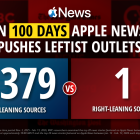 Google is engaged in partisan warfare. And it picked the liberal side, choosing to work with two of the most prominent liberal outlets in the U.S. — The New York Times and Washington Post.
Google is engaged in partisan warfare. And it picked the liberal side, choosing to work with two of the most prominent liberal outlets in the U.S. — The New York Times and Washington Post.
The company detailed its efforts to fight “misinformation” at the Munich Security Conference on February 16. Google boasted that users trust the information they find on Google Search, and that information “comes from the reporting of journalists,” One of the solutions to fight “misinformation” was the Google News Initiative, which supports “quality journalism.”
But Google seems to support the quality journalism that can only be find in liberal media outlets, according to a white paper presented to the conference.
Google sang the praises of its partner, The Washington Post in a paper dated December 2018, calling it responsible for “many seminal moments in investigative journalism.”
Google listed “combating misinformation” as one of its goals in starting the Google News Initiative. It praised the Washington Post as providing “industry leadership” in that field.
But the Post has becoming increasingly partisan under President Donald Trump. One month into the new presidency, it changed its slogan to “Democracy Dies in Darkness.” It has also published “misinformation” in the past, even standing by it to a certain degree. One famous example involved claims Russia hacked a Vermont power grid, which the Post mistakenly reported.
[ads:im:1]
Another story published by the Post ascertained that Trump installed a golf simulator in the White House. Snopes wrote that this was “unproven.” When then Attorney General Jeff Sessions was misquoted as calling illegal immigrants “filth,” the Post published it as a story. Even the Post’s fact-checker has been much criticized for liberal bias.
Google News Initiative also allied itself with the The New York Times. While allegedly these partnerships are meant for developing technology, the list of standards set out by Google News make it seem as if the company sees itself as a publisher, not a neutral search engine.
The Times has had its fair share of fake news controversies. From misattributed obituary stories to falsely alleging former U.N. ambassador Nikki Haley’s had spent $52,000 on curtains, it would be hard to say that the Times is neutral.
Google also partnered with the South China Morning Post, Hong Kong’s leading newspaper. Google has gotten into hot water with its Project Dragonfly, which was supposedly a plan to build a censored search engine for China.
[ads:im:2]









